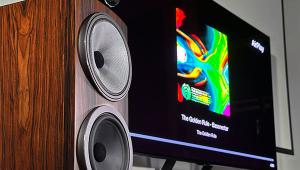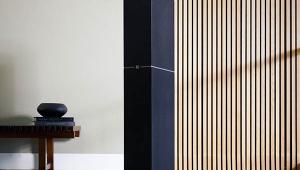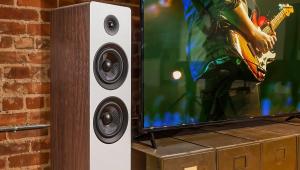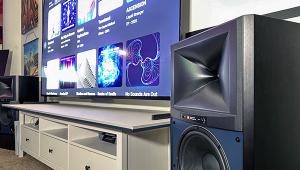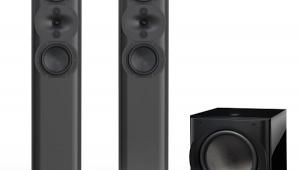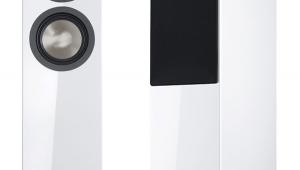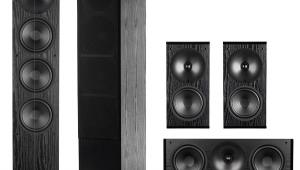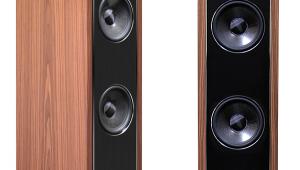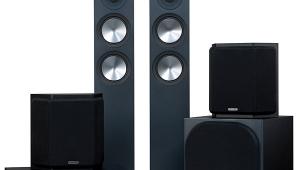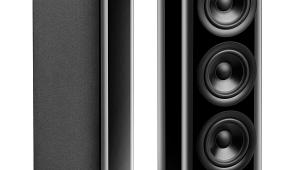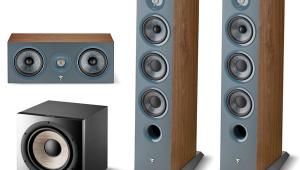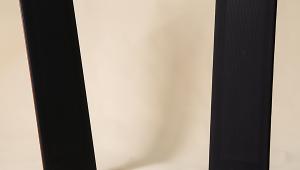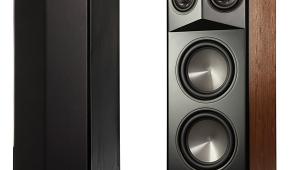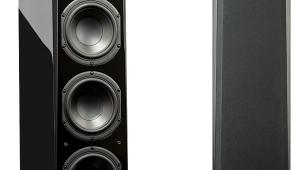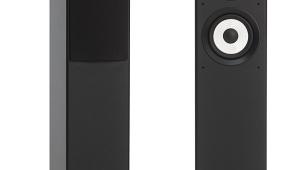Thiel CS1.6 speaker Page 2
Project Green Light
Donnie Darko (DVD, 20th Century Fox 2004057) may be a "hare" frightening for a younger audience, and just "plane" weird for the English Tea Party crowd, but it's rapidly becoming one of my favorite flicks. I'm sure it has a lot to do with the superb soundtrack, peppered with hits from the 1980s. The Thiel didn't sugarcoat the overproduced, overcompressed pop mixes, but they were still enjoyable. Even driven to high levels, the sound never became harsher than these EQ'd-to-death tracks warranted.
Michael Andrews' score creates such a powerfully emotional ambience that only perfect seems adequately descriptive. The end of the movie holds some of the treasures of the score. First is a song written by Roland Orzabal, "Mad World," sung by Gary Jules and accompanied simply by Andrews on piano and synth. Jules' spacious, reverb-soaked voice reached deeply through the room, in sharp contrast to the intimately breathed sighs of a family in mourning. The Thiels combined these discrete environs into a holistic image in which this sort of dichotomy seemed commonplace. As the credits roll, an aria—a requiem, really—leads into a series of other short arias and thematic recaps that, strung together, capture the mood of the film like a parting Cliff's Notes.
By this point, the Thiels were in their glory, simply waiting for General Admission to pin purple hearts on their grillecloths. The sense of being awash in a sea of sound was convincing. One visitor—someone in the HT business, actually—dropped in for a flick and let me pick. He simply said, as the credits finished and the autumn thunder of the menu returned, "this is better than any movie theater I've been to." I'm convinced he wasn't commenting on the burnt popcorn.
From the opening, and instantly recognizable, 20th Century Fox teaser of The Deep End (DVD, Fox 2003167), the Thiels proved that they were subject to little of the compression expected from a speaker in their price category. Peter Nashel's excellent score is masterfully mixed into all five channels; the combination of acoustic and electric guitars, synthesizers, and percussion is highly evocative. While the blending of Foley effects is only somewhat less accomplished than on Donnie Darko, the CS1.6s still reveled in their own excellent resolution. The speakers moved seamlessly from quiet dialogue, to sparsely scored music intended to build suspense, through to the inevitable final conflict, simply getting louder and more committed while showing not the slightest strain. Dynamically, the Thiels played well above their league. Points of punctuation were sharp, fast, even electrostatic-like. It would be so easy to think the macrodynamics of such a small speaker would be limited; after several months of listening to them, I conclude otherwise.
Many systems fall apart when sounds travel around a room. The continuity of the sound as it travels from the front of a system to the rear, or vice versa, is often marred by a discrepancy in timbre between the front and rear speakers. Theoretically, five identical speakers pose no such problem, but difficulties in placement and a speaker's inherent dispersion characteristics mean that there is no guarantee that "equal" means "effective."
One movie that tests the quality of a system's rear-to-front blend is The Others (DVD, Dimension 24168). At the end of chapter 5, Nicole Kidman stands in a spare bedroom, turning in place amid a sea of furniture and statues covered in white sheets, as whispering voices seem to travel from rear left to front left, while her frightened breathing remains fixed in the center channel. The CS1.6s projected the illusion artfully. The nature of the voices remained identical regardless of position—somewhat darker and with less presence when behind you than in front, but that's just as Mother Nature intended by giving us all big, fleshy pinnae.
Conclusions
The speaker market was crowded before the advent of home theater; now, the choices are even more intimidating. There are a few fine speakers in the Thiel CS1.6's not unreasonable price category, but the CS1.6 is one of the finest all-purpose speakers I've heard. My vinyl popped to life just as much as my DVDs did. Plus, a quintet of identical speakers makes achieving a pleasing and accurate balance so much easier.
Don't expect earth-shattering bass from a small 2-way, but as I roll out the last of my review, I'm sitting listening to my turntable, and the bass, unassisted by a subwoofer, is comfortable and enjoyable. Otherwise, of course, this is home theater—make sure you pick up a decent subwoofer. Elsewhere, the Thiel is all magic, with a midrange that's warm and inviting yet remains resolute and very detailed. The CS1.6's tweeter is simultaneously extended and sweet, with none of the tendency toward brightness that mars many metal tweeters.
I've not always been happy with the smaller Thiel speakers I've heard in audio salons. They had a tendency to arrive at their high degree of resolution by shining a bright spotlight on the lower treble, at least in comparison with their bass and lower midrange. But I think Jim Thiel is now well beyond that in his designs. The CS1.6 struck a balance that was not only remarkable for a speaker at its price, it was remarkable for a speaker at any price. The next time someone asks me what kind of home-theater speaker system they can get for $1000, I'll tell them to get one CS1.6 and save up for the rest. This little speaker has forever colored my way of thinking.
- Log in or register to post comments

